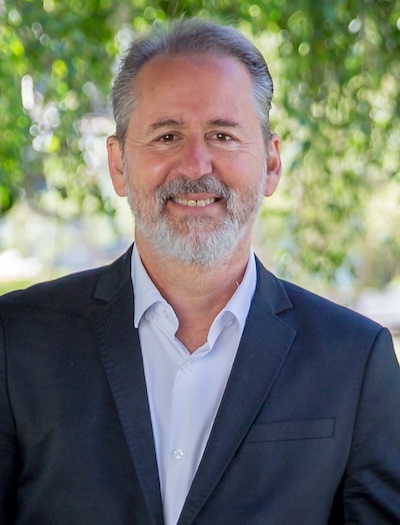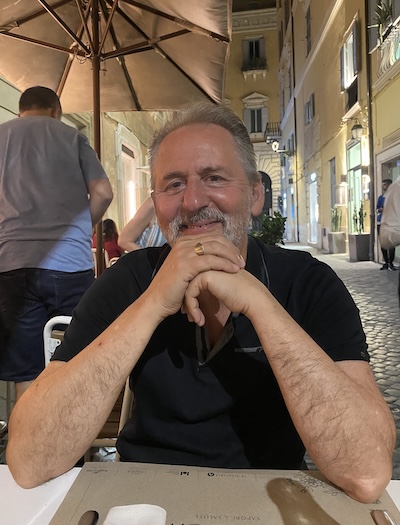
Alumni Spotlight: Dr. Joshua Coleman
 “Psychology is a great field and is always growing,” reflected Dr. Joshua Coleman, a 1989 graduate of the Wright Institute’s Clinical Psychology Program. “It’s impossible for us to learn everything that would be good for us to know, but we should try.” Since his time at the Wright Institute, Dr. Coleman has established himself as an expert in the field of family estrangement through his publications, media appearances, and work in private practice.
“Psychology is a great field and is always growing,” reflected Dr. Joshua Coleman, a 1989 graduate of the Wright Institute’s Clinical Psychology Program. “It’s impossible for us to learn everything that would be good for us to know, but we should try.” Since his time at the Wright Institute, Dr. Coleman has established himself as an expert in the field of family estrangement through his publications, media appearances, and work in private practice.
Dr. Coleman was born in El Paso, Texas, the second of three sons in a middle-class Jewish family. When he was young, the family moved to Dayton, Ohio, where he and his brothers were raised. “I don’t feel like I had a particularly inspiring education in grade school or high school,” he admitted, “but I had a few good teachers and that sometimes makes a difference.” Neither of Dr. Coleman’s parents were college graduates, but they were voracious readers and instilled their curiosity and love of learning into their children.
For his undergraduate studies, Dr. Coleman attended Ohio State University, where he majored in psychology. He became interested in psychology as a career path at a very young age. “My father was in the Navy in WWII and his job was to evaluate soldiers for shell shock who were coming back from battle,” he recalled. “He wasn’t a therapist, but he maintained an interest in the field and that sparked mine.” Overall, Dr. Coleman had a very positive experience at Ohio State. “The department of psychology had a strong research emphasis,” he reflected. “I think that prepared me for critical thinking and analysis.” In 1975, he graduated with a BA in psychology.
Early in his career, Dr. Coleman held positions working in two different psychiatric wards. From 1976-1978, he was a family therapist on a locked inpatient psychiatry ward at Kettering Medical Center in Kettering, Ohio. Upon moving to California in 1978, he began a similar position as a mental health worker at California Pacific Medical Center in San Francisco. “CPMC is a teaching hospital, so I learned a lot from the psychiatrists on staff,” he explained. “It also gave me first-hand experience working with more difficult and troubled populations.” These experiences were an excellent foundation for Dr. Coleman, who was already a Licensed Marriage and Family Therapist, but he wanted to further his knowledge and chose to pursue a doctoral degree.
In 1985, Dr. Coleman enrolled in the Wright Institute’s Clinical Psychology program. “Having experience in the field was helpful because it made the topics under discussion less purely theoretical,” he shared. “It also strengthened my desire to deepen my understanding of the problems I was seeing both in my practice and from my prior inpatient work.” During his time at the Wright Institute, Dr. Coleman enjoyed being exposed to the ideas and viewpoints of his professors and his fellow students and learning from their lived experiences. “I think the intellectual climate and wide-ranging curriculum deepened my interest in the field,” he reflected. “I still find myself quoting books and authors that I first learned of at the Wright.”
Thinking back on his time at the Wright Institute, Dr. Coleman offers the following advice to current and prospective students: “Find professors whose work deeply speaks to you and take as many classes as you can with them.” Dr. Coleman particularly enjoyed the classes he took with Dr. Richard Lichtman and Dr. Terry Kupers, who still teaches at the Wright Institute today. “I loved the bridging of political, economic and psychodynamic perspectives that they offered,” he explained. He also has strong memories of visiting Caffe Strada several times a week to read or write. “It was filled with other undergraduate and graduate students,” he recalled, “and that created a great environment for study or socializing.” Dr. Coleman graduated from the Wright Institute with a PhD in clinical psychology in 1989.
In February of 1988, Dr. Coleman opened his own private practice, working with individuals, couples, and families. His areas of expertise are estrangement between parents and children and conflict within couples. “Becoming a therapist has a very steep learning curve,” he explained. “It’s critically important to have ongoing consultation no matter your level or experience.” Thankfully, Dr. Coleman has developed a network of other clinicians with whom he can consult on difficult cases. For the past 25 years, he has been in weekly consultation with Dr. Jamie Edmund, also a Wright Institute graduate. “There will always be clients who test your abilities,” Dr. Coleman admitted, “but the most rewarding part of the work is being able to make a big impact on peoples’ lives.”
Over the last two decades, Dr. Coleman has published four books about marital conflict and family estrangement: The Marriage Makeover: Finding Happiness in Imperfect Harmony, The Lazy Husband: How to Get Men to Do More Parenting and Housework, When Parents Hurt: Compassionate Strategies When You and Your Grown Child Don't Get Along, and Rules of Estrangement: Why Adult Children Cut Ties and How to Heal the Conflict. He has also written several book chapters and published many academic journal and newspaper/magazine articles. Two articles he wrote for The Atlantic, “A Shift in Family Values is Fueling Estrangement” and “The Key to Escaping the Couple Envy Trap,” received the greatest response and resulted in many media opportunities.
Rules of Estrangement: Why Adult Children Cut Ties and How to Heal the Conflict, Dr. Coleman’s most recent book, really resonated with the public and received rave reviews. “A recent study out of Ohio State found that 26% of fathers and 6% of mothers are estranged from their adult children,” he explained. “Estrangement appears to be growing more prevalent as a result of high divorce rates, rising rates of individualism, atomization, therapeutic culture and the role of social media influencers.” The skyrocketing rates of estrangement among American families has meant an increasingly large audience for Dr. Coleman’s work.
Dr. Coleman serves as a Senior Fellow with the Council on Contemporary Families, a non-profit organization focused on providing the public with the latest research about American families. “I discovered that some of my favorite historians, psychologists, sociologists and economists were all affiliated with that group,” he recalled. “I started going to their conferences and was eventually asked to be on the board.” Dr. Coleman spent years as a co-chair of the board, but in his current role as a Senior Fellow, his role is to help publicize new research about families in the media.
Over the years, Dr. Coleman has made a wide array of media appearances. “One that stands out was Sesame Street because it’s Sesame Street,” he laughed. “It was wonderful to be associated with such a beloved institution.” In addition to Sesame Street, Dr. Coleman has been featured on NPR, 20/20, The Today Show, Good Morning America, and many other television shows, radio programs, and podcasts. “In general, TV is challenging because you have to be so “on” but I like the high stakes nature of it,” he shared. “I’ve been on NPR and NYU Psychiatry Doctor’s Radio many times and that allows for a much deeper and rewarding way to get into the nuances of a perspective.”
 In addition to his impressive career as a psychologist and author, Dr. Coleman also plays guitar and writes music for television. “I’ve been a musician since I was thirteen and played in bands until I was in my early forties,” he explained. “Writing music for TV was a way to keep a hand in music while acknowledging my decreased ability to stay out until one or two in the morning.” His music has been featured in shows like Keeping Up With the Kardashians, Lethal Weapon, Chicago Fire, Chicago PD, Pretty Little Liars, Longmire, Shameless, RuPaul's Drag Race, and many others. He was called an “incredible guitar player with whip-smart lyrics” by Michael Goldberg, writer for Rolling Stone Magazine.
In addition to his impressive career as a psychologist and author, Dr. Coleman also plays guitar and writes music for television. “I’ve been a musician since I was thirteen and played in bands until I was in my early forties,” he explained. “Writing music for TV was a way to keep a hand in music while acknowledging my decreased ability to stay out until one or two in the morning.” His music has been featured in shows like Keeping Up With the Kardashians, Lethal Weapon, Chicago Fire, Chicago PD, Pretty Little Liars, Longmire, Shameless, RuPaul's Drag Race, and many others. He was called an “incredible guitar player with whip-smart lyrics” by Michael Goldberg, writer for Rolling Stone Magazine.
Dr. Coleman lives in the San Francisco Bay Area and enjoys spending his free time with his wife, three adult children, and teenage grandson. “I’ve been studying classical piano for the past 2 years,” he shared. “I doubt any of it will ever make its way onto a show (unless it’s a reality show about people learning how to play classical piano), but I like the challenge and discipline of it.” He’s also an avid non-fiction reader most interested in the fields of history, sociology, and evolution.
